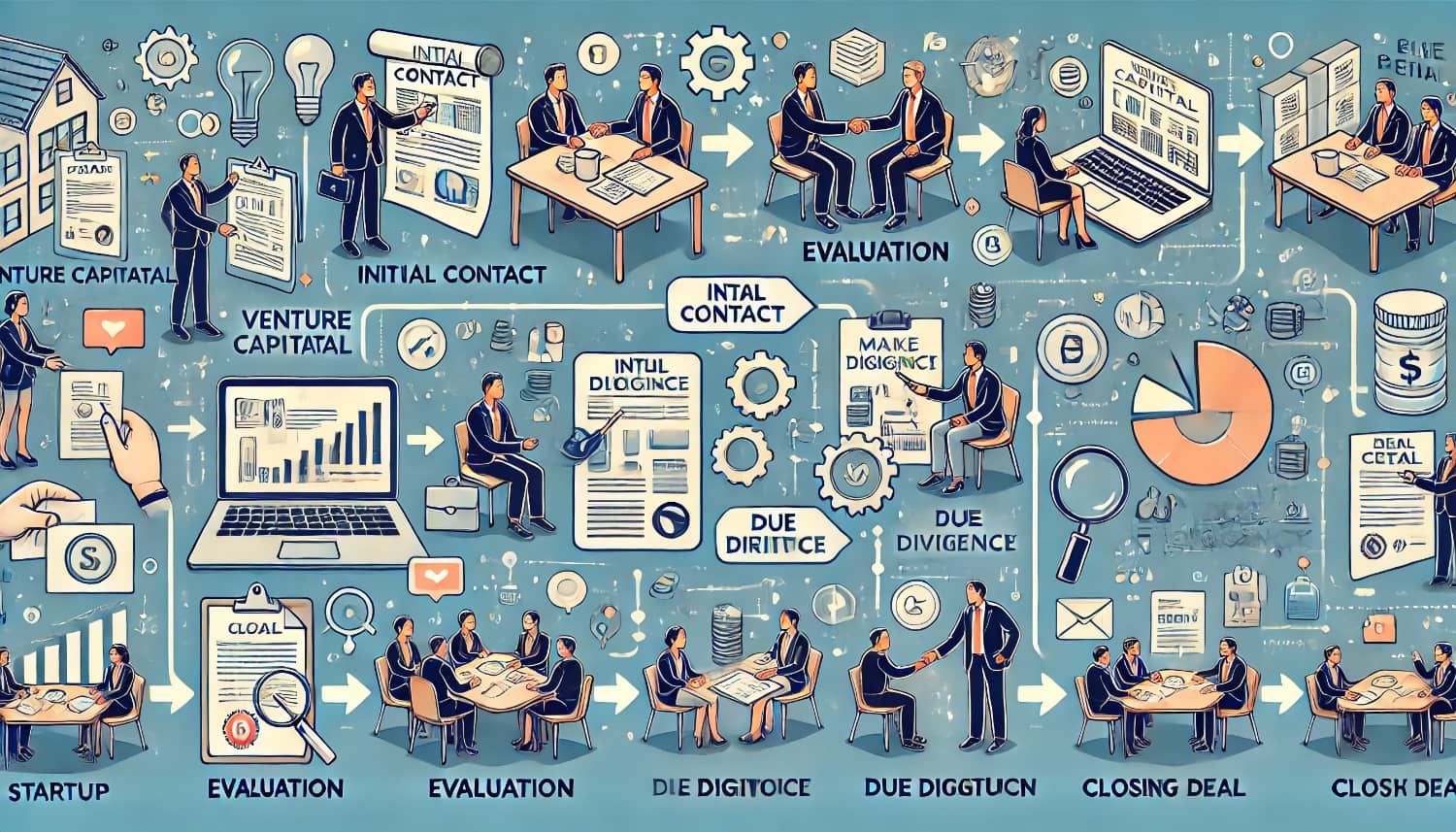In the fast-paced world of venture capital, staying ahead of the curve is crucial. As the landscape evolves, artificial intelligence (AI) is emerging as a game-changer in the realm of deal sourcing. This article explores how AI is reshaping the way VCs identify and evaluate investment opportunities, offering unprecedented efficiency and insights.
Understanding VC Deal Sourcing
Deal sourcing is the lifeblood of venture capital firms. It's the process by which VCs identify potential investment opportunities for their funds. Traditionally, this process has relied heavily on networking, personal relationships, and manual research. However, the advent of AI is revolutionizing these methods, bringing a new level of sophistication to the process.
The Impact of Effective Deal Sourcing
The success of a VC firm largely depends on the quality of its deal flow. Effective deal sourcing can:
Increase the quantity and quality of investment opportunities
Improve the chances of identifying high-potential startups early
Enhance the overall performance of the VC portfolio

The Rise of AI in Venture Capital
The adoption of AI in venture capital is gaining momentum. According to a recent report by Deloitte, 29% of venture capital firms are already using AI in their investment processes, with this number expected to grow significantly in the coming years.
Key Drivers Behind the AI Revolution in VC
Data explosion: The increasing availability of data about startups, markets, and technologies
Competitive pressure: The need to identify promising deals faster and more accurately
Efficiency demands: The desire to streamline the deal sourcing and evaluation process
How AI Enhances Deal Sourcing
AI is transforming deal sourcing in several key ways:
AI Capability | Impact on Deal Sourcing |
Data Analysis | Processes vast amounts of data from diverse sources |
Pattern Recognition | Identifies market trends and potential opportunities |
Predictive Analytics | Assesses startups' potential for success |
Automated Screening | Efficiently filters investment opportunities |
Data Analysis and Pattern Recognition
AI-powered platforms can analyze enormous volumes of data from various sources, including social media, news articles, and financial reports. This capability allows VCs to identify potential investment opportunities that might have otherwise gone unnoticed.
For example, machine learning algorithms can recognize patterns and trends that may indicate a startup's potential for success. According to McKinsey, AI can improve the accuracy of identifying high-growth startups by 25%.
Predictive Analytics for Startup Evaluation
One of the most powerful applications of AI in deal sourcing is predictive analytics. By analyzing historical data and current market trends, AI can forecast a startup's future performance, providing valuable insights and reducing the uncertainty associated with early-stage investments.
Studies have shown that predictive analytics can increase the return on investment by up to 30% for venture capital firms using these technologies.
Key Benefits of AI-Powered Deal Sourcing
The integration of AI into the deal sourcing process offers numerous advantages for venture capital firms. Let's explore the primary benefits:
1. Improved Efficiency and Cost Savings
AI significantly streamlines the deal sourcing process, reducing the time and resources required to identify and evaluate investment opportunities. According to Gartner, AI can reduce research time by up to 40%, allowing investors to focus on high-potential leads. This efficiency not only saves costs but also enables firms to scale their operations more effectively.
2. Enhanced Decision-Making Through Data-Driven Insights
By leveraging big data and advanced analytics, AI provides VCs with a more comprehensive view of potential investments. This data-driven approach enables:
More objective evaluation of startups
Identification of hidden patterns and correlations
Better assessment of market trends and potential disruptions
As a result, VCs can make more informed decisions, potentially leading to better investment outcomes.
3. Competitive Advantage in Identifying Promising Startups
AI-powered tools give VCs an edge in discovering high-potential startups before their competitors. By analyzing vast amounts of data and identifying early signals of success, these tools can help VCs:
Uncover hidden gems in the startup ecosystem
Engage with promising companies at earlier stages
Secure deals with more favorable terms
4. Scaling Deal Flow and Expanding Reach
AI enables VCs to dramatically increase their deal flow without a proportional increase in human resources. This scalability allows firms to:
Evaluate a larger number of potential investments
Expand into new geographic markets or sectors
Maintain a more diverse and robust deal pipeline

Implementing AI in VC Deal Sourcing
To harness the power of AI in deal sourcing, VCs need to consider several key factors:
AI-Powered Platforms and Tools for VCs
Several platforms have emerged to help VCs leverage AI in their deal sourcing efforts. For example, InvestHub, mentioned in Article 1, uses advanced AI and machine learning tools to provide a comprehensive, data-driven approach to deal sourcing.
Integrating AI with Existing CRM and Deal Management Systems
For maximum effectiveness, AI tools should be integrated with existing systems. This integration allows for:
Seamless data flow between different parts of the investment process
More accurate and up-to-date information for decision-making
Better tracking of deal progress and outcomes
Balancing AI Insights with Human Expertise
While AI offers powerful capabilities, it's crucial to combine these insights with human judgment and industry expertise. The most successful VC firms will likely be those that strike the right balance between AI-driven analysis and human intuition.
Key Takeaway:
AI is not meant to replace human decision-making in VC, but to augment and enhance it. The goal is to empower VCs with better information and insights, enabling them to make more informed investment decisions.
Challenges and Considerations
While AI offers tremendous potential for improving VC deal sourcing, there are several challenges and considerations that firms must address:
Data Quality and Availability
The effectiveness of AI in deal sourcing heavily depends on the quality and quantity of data available. VCs face several challenges in this area:
Data accuracy: Ensuring the data used for analysis is accurate and up-to-date
Data completeness: Dealing with missing or incomplete information about startups
Data integration: Combining data from various sources into a cohesive dataset
To address these challenges, VCs need to:
Invest in robust data collection and verification processes
Utilize multiple data sources to cross-verify information
Implement data cleaning and normalization techniques
Ethical Considerations in AI-Driven Decision Making
As AI plays an increasingly significant role in investment decisions, ethical considerations come to the forefront:
Bias in algorithms: Ensuring AI systems don't perpetuate or amplify existing biases in the VC industry
Transparency: Maintaining clarity about how AI influences decision-making processes
Privacy concerns: Respecting the privacy of startups and individuals when collecting and analyzing data
VCs must be proactive in addressing these ethical concerns to maintain trust and credibility in the ecosystem.
Adapting to New Technologies and Processes
Implementing AI in deal sourcing requires significant changes to existing processes and workflows. This can present challenges such as:
Resistance to change: Overcoming reluctance from team members accustomed to traditional methods
Skills gap: Ensuring the team has the necessary skills to work with AI tools effectively
Integration complexities: Seamlessly incorporating AI into existing systems and processes
To successfully adapt, VCs should:
Provide comprehensive training and support for team members
Start with pilot projects to demonstrate the value of AI
Gradually scale up AI implementation based on lessons learned
The Future of AI in VC Deal Sourcing
As AI technology continues to advance, its role in VC deal sourcing is likely to expand. Here are some emerging trends and potential future developments:
Emerging Trends and Technologies
Natural Language Processing (NLP): Advanced NLP capabilities will enable AI to extract insights from unstructured data sources like news articles, social media, and company websites.
Sentiment Analysis: AI will be able to gauge market sentiment and startup perception more accurately, providing additional context for investment decisions.
Blockchain Integration: Combining AI with blockchain technology could enhance data security and transparency in the deal sourcing process.
The Potential for AI to Identify "Unicorns"
As AI systems become more sophisticated, they may become increasingly adept at identifying potential "unicorns" - startups with the potential to reach billion-dollar valuations. This could involve:
Analyzing complex patterns across multiple data points
Predicting market trends and disruptions with greater accuracy
Identifying unique combinations of factors that lead to exceptional growth
Global and Diverse Deal Sourcing with AI
AI has the potential to dramatically expand the geographical and demographic reach of VC deal sourcing:
Breaking geographical barriers: AI can help VCs identify promising startups from anywhere in the world, expanding beyond traditional tech hubs.
Promoting diversity: By reducing reliance on personal networks, AI can help surface opportunities from underrepresented founders and markets.
Future Outlook:
The continued evolution of AI in VC deal sourcing is likely to lead to a more efficient, data-driven, and globally inclusive investment landscape. VCs that successfully harness these technologies will be well-positioned to identify the most promising opportunities in an increasingly competitive market.
Case Studies: Success Stories of AI-Powered Deal Sourcing
To illustrate the transformative impact of AI on VC deal sourcing, let's examine two real-world examples of firms that have successfully leveraged this technology.
Case Study 1: Enhancing Deal Flow with AI
Firm: InvestTech Ventures (Name changed for privacy)
Challenge: InvestTech Ventures, a mid-sized VC firm, was struggling to efficiently process the increasing volume of potential deals while maintaining quality standards.
Solution: The firm implemented an AI-powered deal sourcing platform that integrated with their existing CRM system.
Results:
200% increase in deal flow within 6 months
40% reduction in time spent on initial screening
Identification of 3 high-potential startups that were previously overlooked
Key Takeaway: By automating the initial screening process and leveraging predictive analytics, InvestTech Ventures significantly improved their deal flow quality and quantity while reducing manual effort.
Case Study 2: AI-Driven Discovery of a High-Potential Startup
Firm: Global Innovation Capital (GIC)
Challenge: GIC aimed to expand into emerging markets but lacked the network and local knowledge to effectively source deals in these regions.
Solution: GIC employed an AI system that analyzed global startup data, including patent filings, academic publications, and local news sources in multiple languages.
Results:
Discovered a promising fintech startup in Southeast Asia before it gained widespread attention
Successfully closed a Series A round, leading to a 5x return on investment within 18 months
Expanded deal sourcing capabilities to 15 new countries
Key Takeaway: AI enabled GIC to overcome geographical barriers and identify high-potential opportunities in unfamiliar markets, demonstrating the technology's power in expanding a VC's reach.

Best Practices for Leveraging AI in Deal Sourcing
Based on these case studies and industry insights, here are some best practices for VCs looking to implement AI in their deal sourcing processes:
Develop a Clear AI Strategy
Align AI implementation with overall investment goals
Define specific objectives for AI in deal sourcing (e.g., increasing deal flow, improving quality of leads)
Create a roadmap for gradual AI integration
Ensure Data Quality and Management
Invest in robust data collection and cleaning processes
Use multiple data sources to ensure comprehensive coverage
Regularly audit and update data to maintain accuracy
Combine AI Insights with Industry Expertise
Use AI as a tool to augment, not replace, human decision-making
Encourage collaboration between AI specialists and investment professionals
Develop frameworks for interpreting and acting on AI-generated insights
Continuous Learning and Adaptation
Regularly evaluate the performance of AI tools and adjust as needed
Stay informed about new developments in AI and machine learning
Foster a culture of innovation and experimentation within the firm
Implementing These Best Practices
Here's a simple framework for putting these best practices into action:
Step | Action | Purpose |
1 | Assess current deal sourcing process | Identify areas for improvement |
2 | Set specific AI implementation goals | Provide clear direction |
3 | Choose appropriate AI tools/platforms | Align technology with needs |
4 | Train team on new AI-driven processes | Ensure smooth adoption |
5 | Monitor and measure results | Track impact and ROI |
6 | Iterate and improve | Continuously optimize AI usage |
By following these best practices, VC firms can maximize the benefits of AI in their deal sourcing efforts while minimizing potential pitfalls.
The Future is Now: Embracing AI for Revolutionary Deal Sourcing
As we've explored throughout this article, AI is not just a futuristic concept in venture capital-it's a present reality that's reshaping the industry. Let's recap the key points and look ahead to what's next for AI in VC deal sourcing.
Key Takeaways
AI is transforming VC deal sourcing, offering unprecedented efficiency and insights.
Benefits include improved efficiency, enhanced decision-making, and the ability to scale deal flow dramatically.
Challenges such as data quality and ethical considerations must be addressed for successful implementation.
Successful case studies demonstrate the tangible impact of AI on deal sourcing outcomes.
Best practices include developing a clear AI strategy, ensuring data quality, and balancing AI insights with human expertise.
The Road Ahead
As AI continues to evolve, we can expect even more profound changes in the VC landscape:
Hyper-personalization: AI may enable VCs to tailor their approach to each startup, considering unique factors and potential synergies with existing portfolio companies.
Predictive market analysis: Advanced AI could forecast market trends with increasing accuracy, helping VCs identify emerging sectors before they become mainstream.
AI-driven due diligence: Automated systems may conduct initial due diligence, allowing human experts to focus on nuanced aspects of potential investments.
Final Thought:
AI in VC deal sourcing is not just about finding more deals-it's about finding the right deals more efficiently. By leveraging AI, VCs can uncover hidden gems, make more informed decisions, and ultimately drive better returns for their investors.


